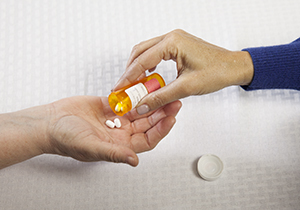Post-traumatic stress disorder (PTSD) can happen after you go through a severe trauma. Along with talk therapy (counseling), medicine may help manage your symptoms. As a result, you may feel less anxious or depressed. You may feel able to do better work in therapy.
Starting a medicine
Antianxiety medicine eases symptoms and helps you relax. Your doctor and pharmacist will explain when and how to use it. It may be prescribed for use before situations that make you anxious. Or you may be told to take it on a regular schedule. Antianxiety medicine may make you feel a little sleepy. Don’t drive a car or work with machinery while on this medicine, until you know how it affects you.
At first, types of medicines and doses may need to be adjusted to find what works best for you. Try to be patient. Many medicines can take weeks to work well. Tell your doctor how a medicine makes you feel.
Medicines can have side effects. Tell your doctor about side effects that bother you. Changing the dose or type of medicine may help. Don’t stop taking medicine on your own. This can cause serious withdrawal symptoms. And it can bring back PTSD symptoms.
Important safety note
Never use alcohol or other drugs with antianxiety medicine. This could lead to extreme tiredness, confusion, breathing problems, falls, coma, or death. Use only the amount of medicine prescribed to you. Never take more. Never use another person's prescription. And never share your medicine. If you think you may have taken too much, get emergency help right away.
Taking medicine as prescribed
Never change your dose or stop your medicine on your own. Talk with your doctor first. Keep in mind:
-
Some medicine must be taken on a schedule. Make this part of your daily routine. For example, you might always take your pill before brushing your teeth. A pillbox can help you remember if you’ve taken your medicine each day.
-
Medicine is often taken for 6 to 12 months. Your doctor will then decide if you need to keep taking them. Many people in talk therapy may no longer need medicine.
-
You may need to stop taking the medicine slowly. This is to give your body time to adjust. When it’s time to stop, your doctor will tell you how.
-
You may need to take medicine again. If your symptoms come back, you may need medicine again. This isn’t your fault. It’s just the nature of your anxiety disorder. If symptoms return, get care as soon as possible.
Special concerns
-
Side effects. Medicines may cause side effects. Ask your doctor or pharmacist what you can expect. They may have tips for preventing some side effects.
-
Sexual problems. Some people may be put on an antidepressant medicine. This type of medicine can affect your desire for sex or your ability to have an orgasm. A change in dose or medicine often solves the problem. If you have a sexual side effect that concerns you, tell your doctor.
-
Addiction. If you have a history of addiction, you may need to not use some types of medicines. Be honest with your doctor about any past history of drug use. This will help make sure you have the safest medicines for your PTSD symptoms. Antianxiety medicine carries a risk of addiction.
-
Medicine security. Antianxiety medicines are sought after by those who abuse or sell drugs. Keep your medicine in a secure location. Don't keep it in the bathroom cabinet or on the kitchen counter. Make sure the medicine is not visible nor can be reached by friends or family.


